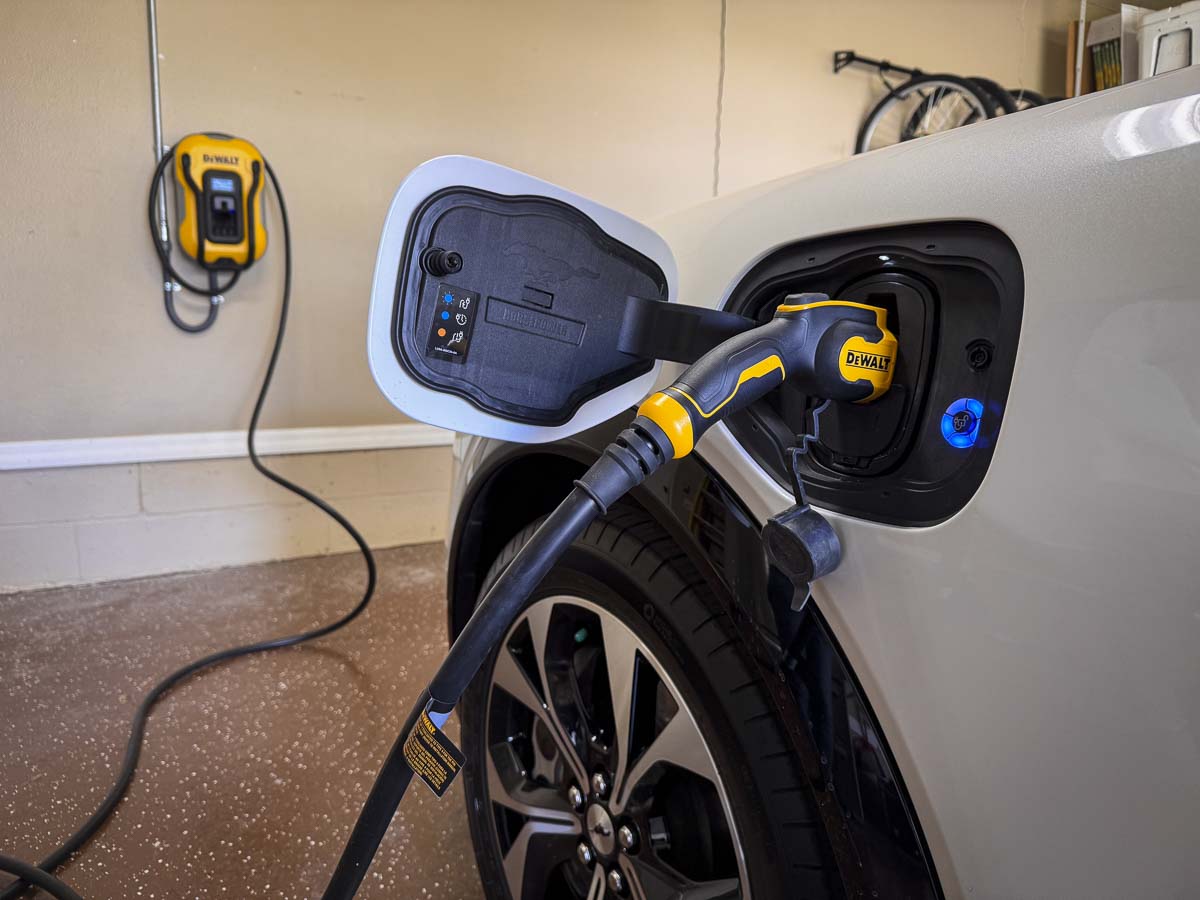DeWalt Gives EV Drivers the Ability to Charge Anywhere
When Paragon Group and DeWalt announced a partnership up to bring EV (electric vehicle) charging to the home, I wanted a first-hand look. DeWalt EV chargers promise convenience, flexibility, and value to consumers looking for 120V Level 1 or 240V Level 2 charging. To learn more, I had a wall-mounted 48A Level 2 charger installed in my 2-car garage. Here’s how that process went…
Table of Contents
Wait a Minute, DeWalt Makes EV Chargers?
Yep. And why not—the familiar Black and Yellow branding might make these a bit more accessible to those of us getting into the world of EVs. Based on the high cost of installation from dealer-sourced EV chargers, this also presents a new and welcome option for upgrading your existing charging capacity, or simply getting ready for a new or upgraded electric vehicle.
DeWalt EV chargers are being manufactured by Paragon Group USA (Paragon). Paragon is a licensee of DeWalt and designed and manufactured the complete EV Charger line with approval from Stanley Black + Decker. They also oversee the promotion and retail sales of the EV chargers.
Qmerit is North America’s leading provider of implementation solutions for EV charging and other energy transition technologies. They provide consumers with an easy one-stop solution for installation—both for residential and business markets. Qmerit works through a network of company-owned contractors, independent Certified Solutions Partners, and Certified Installers skilled in system implementation and integration. They also partner with top automakers from the U.S., Europe and Asia.
Editor’s Note: Qmerit has just issued a white paper, Electrification2030, that examines issues pivotal to broad EV adoption and greater home and building electrification by 2030. For more information, visit the Qmerit website.
Overview of Features and Specifications
DeWalt EV chargers are compatible with all major electric vehicle makes. They use a standard J1772 plug, but you can get an adapter for use with Tesla EV cars. All of the EV chargers include 25-foot UL-certified, high-grade cables. Rated for both indoor and outdoor use, they also feature an IP66 waterproof rating and a number of safety features, like surge protection and circuit temperature sensors.
DeWalt currently offers three different models (a fourth 32 Amp model has not been released yet and will be launching in early March):
| 16A DXPAEV016 | 40A DXPAEV040 | 48A DXPAEV048 | |
|---|---|---|---|
| Current | 120/240V | 240V | 240V |
| Level 2 | 12-16A | 12-40A | 12-48A |
| Mounting | Portable/Wall | Wall | Wall |
| Cable length | 25 ft. | 25 ft. | 25 ft. |
| Plug | J1772 | J1772 | J1772 |
| Protection | IP66 | IP66 | IP66 |
| Price | $299 BUY | $699 BUY | $699 BUY |
All three chargers can be wall-mounted, though the portable 16A model requires an optional $50 bracket to do so. The difference between the models comes down to how much current you want to (and can) provide to the vehicle. If you only ever need to slow charge your vehicle, a 120V charger can literally plug into any 20A outlet.
For the fastest possible home charging, however, I do recommend the use of a Level 2 48A charger. That requires the installation of a 60A breaker in your electrical panel and a conduit run to whoever you plan to mount the wall charger.
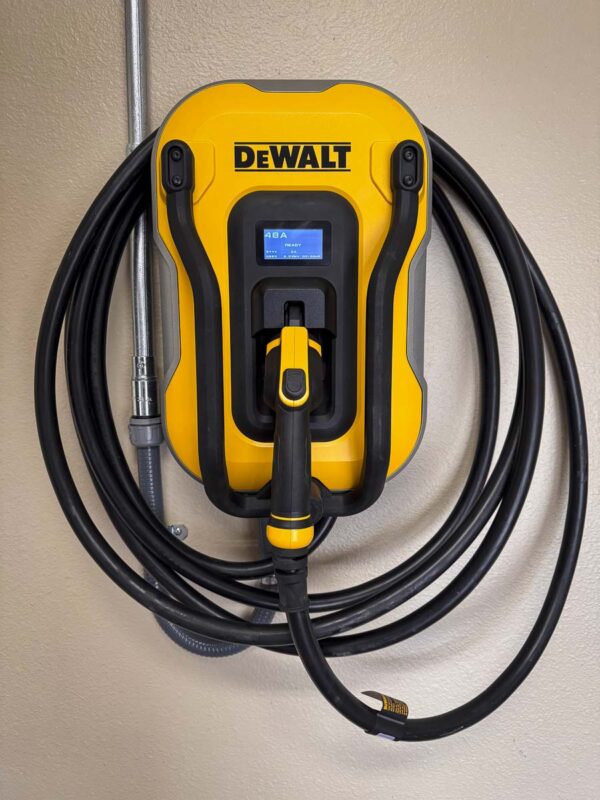
Installing the DeWalt EV Charger in a Garage
For our installation, I filled out the assessment form on the Qmerit website to receive an estimate. That included information about our installation location, vehicle, home, and electrical load. I was also able to upload photos of my electrical panel and the desired location.
Qmerit followed up quickly, assigning me an installer who contacted me with a few more questions to ensure they understood the scope of work. After that, I received an estimate for the work as well as the opportunity to schedule a start date.
Running the New 60A line and Updating the Panel
The installers assigned by Qmerit arrived and laid out the work. The DeWalt charger had arrived earlier, so everything was ready to go. They began by running the new 60A wire across my attic space and down both walls to connect the breaker panel with the opposing wall where we would be mounting the charger.
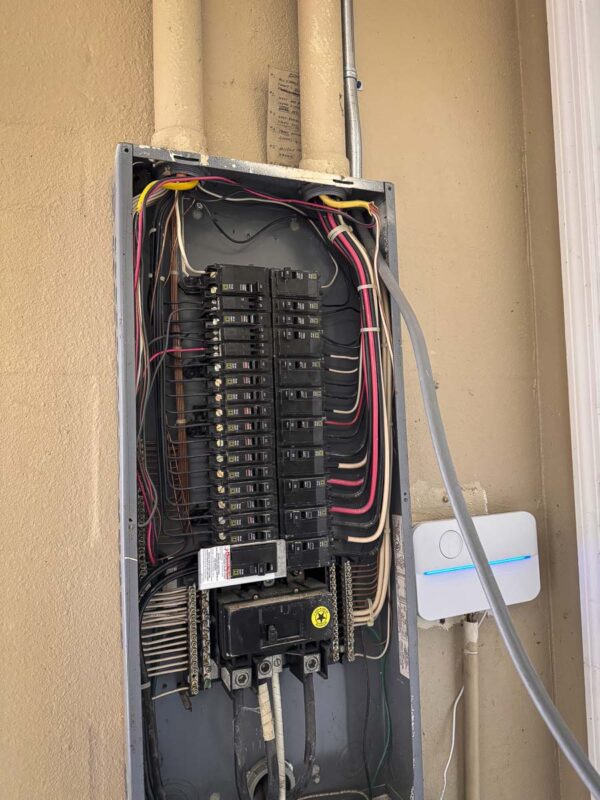
The DeWalt EV charger would be on the rear wall of the garage, and so they measured and installed conduit down the wall.
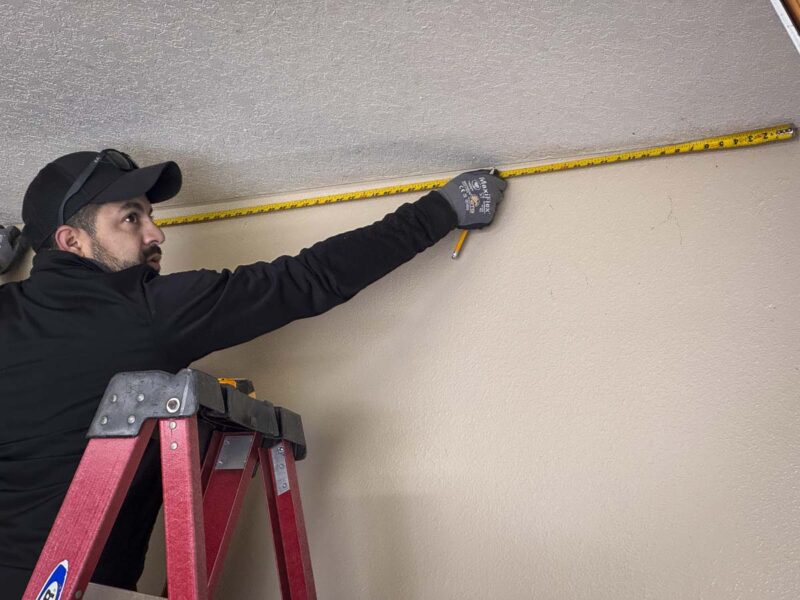
Mounting the Wall Charger
Next, they attached the provided mounting plate. A flexible whip (included with the DeWalt EV charger) gets attached to the conduit and lets you have some flexibility when setting the final position.
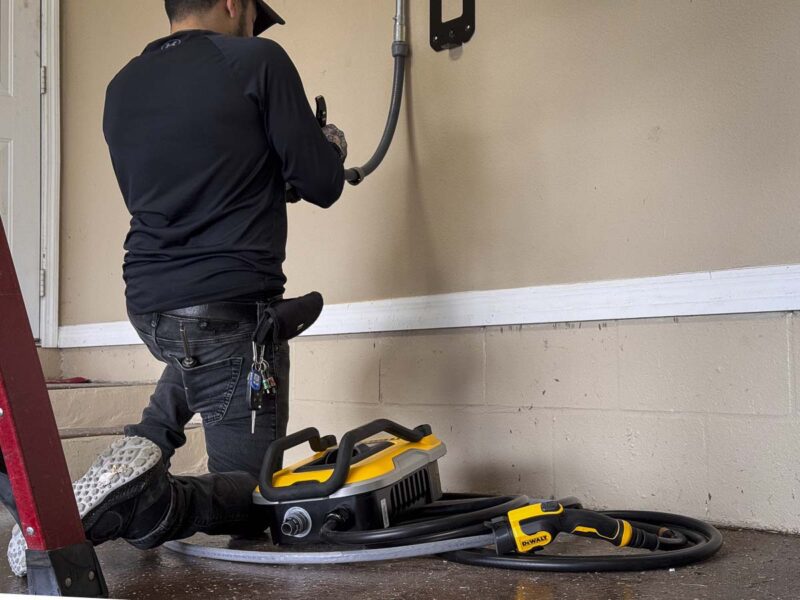
Wiring It Up
Lastly, they added lugs and attached the wires to the DeWalt. Instead of taking off the front cover to attach wiring, DeWalt makes it so you remove a rear panel to make the connections.
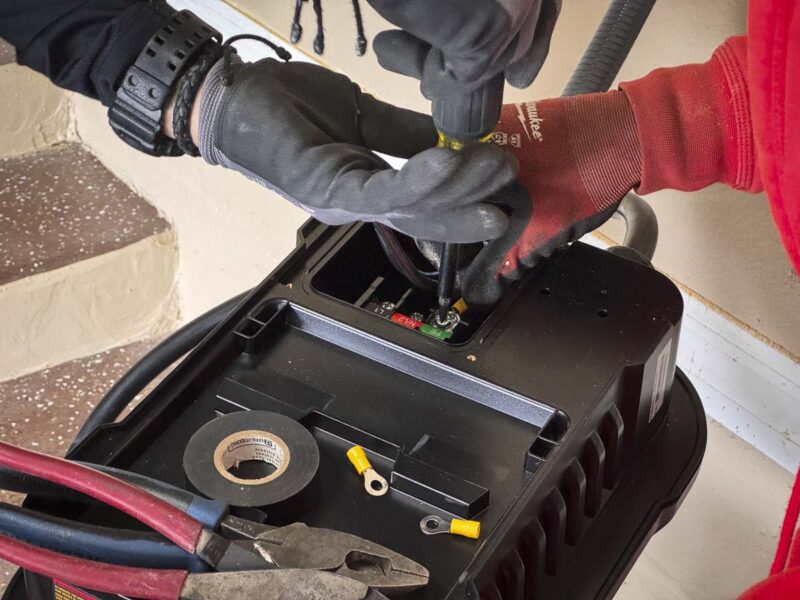
Testing the DeWalt EV 48A Charger
I downloaded and synced the DeWalt EV app (iOS for my iPhone) before doing anything else. It ran a firmware update and then I was ready to begin. One thing I love about high-current EV chargers is that you can “downshift” them to slow charge your vehicle as well. That means you don’t have to charge using 48A of power. This helps extend the life of your vehicle’s batteries.
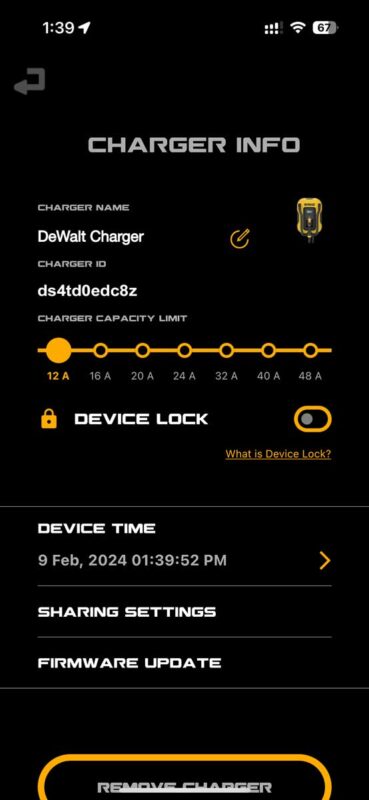
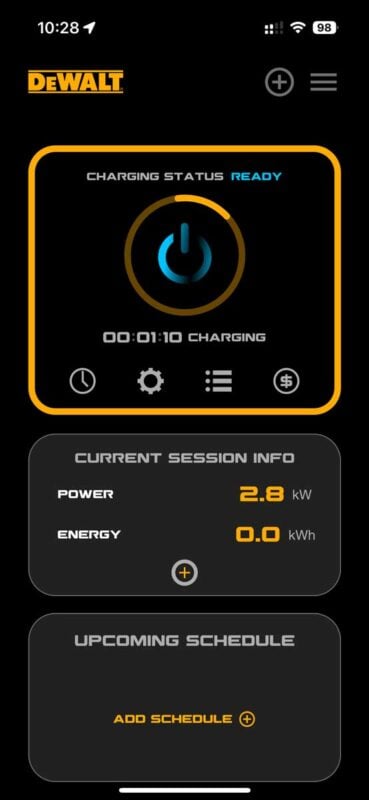
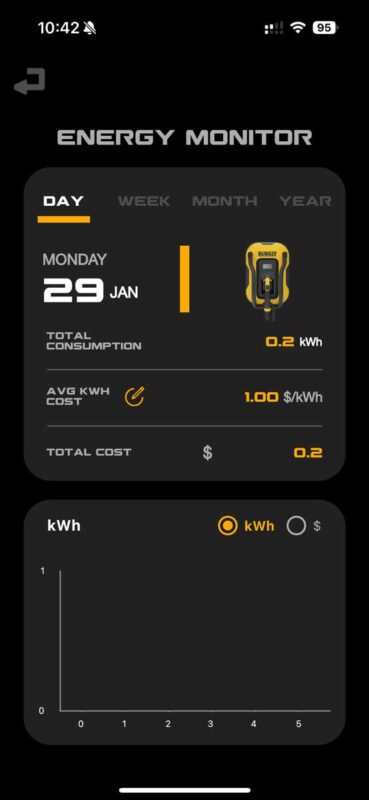
Setting the charger to 12A (its lowest setting), I plugged DeWalt’s “nozzle” into the Mach-E and pressed the large power button icon on the app.
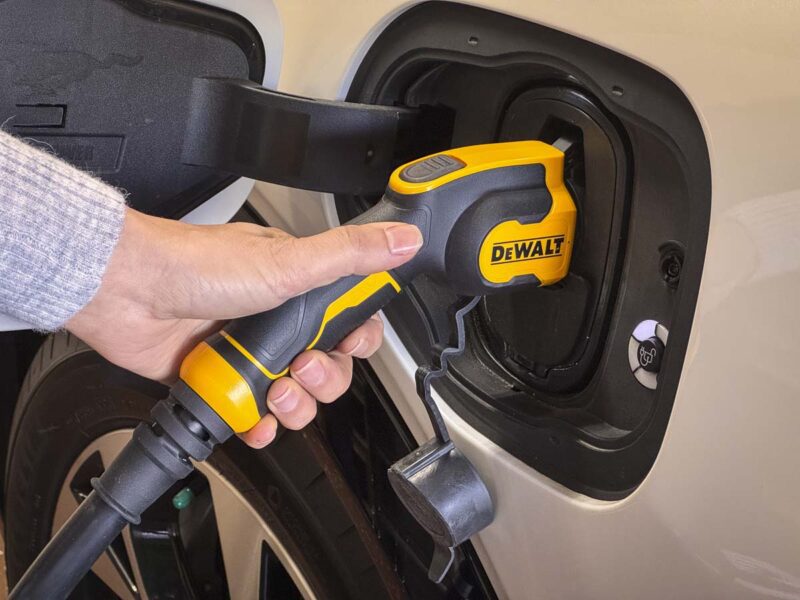
When the DeWalt negotiated a connection with the Ford Mach-E, the 5-LED light ring next to the charger turned Blue and the car began charging.
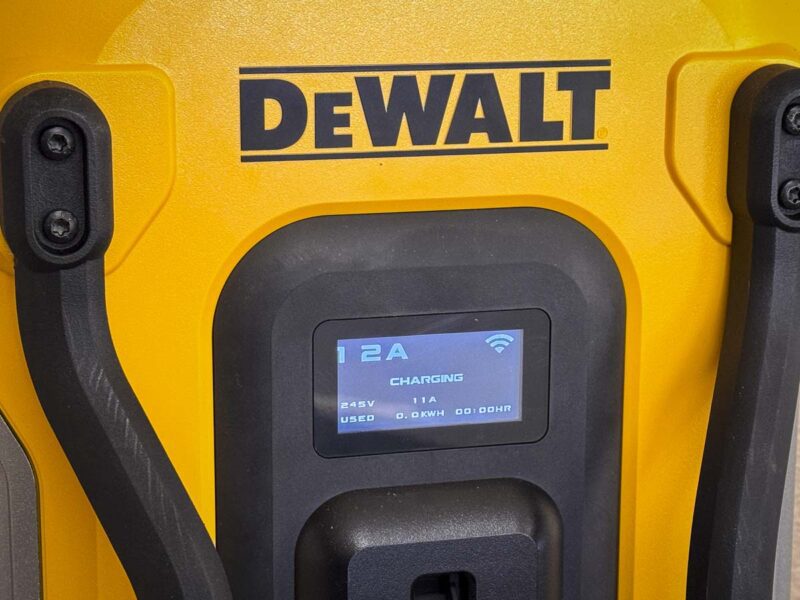
Features
- Compatible with all major vehicle brands ($60 for the optional Tesla adapter)
- 16 and 32 Amp Portable Chargers
- 40 and 48 Amp Wall-Mounted Chargers
- Various adapters and mounting brackets
- 25-foot high-grade cable
- Tesla compatibility with adapter
- The charger automatically determines the optimal amount of electricity to administer
- Prevents overvoltage, overcurrent, overheating, and overcharging
- Rated for both indoor and outdoor use
- Surge protection
- Circuit temperature sensors
- Bluetooth app allows remote start and stop (wall-mounted chargers only)
Which Plug Type Does the DeWalt EV Charger Use?
From the information provided and the photos, DeWalt (natively) uses a J1772 style plug as opposed to the (soon to be) SAE-Standardized Tesla plug that seems to be the emerging USA standard. They do provide compatibility with the Tesla NACS via the use of a $60 adapter. Here’s a breakdown of the major car manufacturers committed to using the Tesla NACS charging plug by 2025:
- Audi
- BMW
- Fisker
- Ford
- Genesis
- GM
- Honda
- Hyundai
- Jaguar
- Kia
- Lexus
- Mazda
- Mercedes-Benz
- Mini
- Nissan
- Polestar
- Porsche
- Rivian
- Stellantis [Chrysler, Dodge, Jeep, Maserati, and Ram]
- Tesla
- Toyota
- Volkswagen
- Volvo
Presumably, DeWalt will issue an updated plug option beginning in 2025 as more and more vehicles adopt the Tesla NACS standard plug. That will eliminate the need for an adapter when charging.
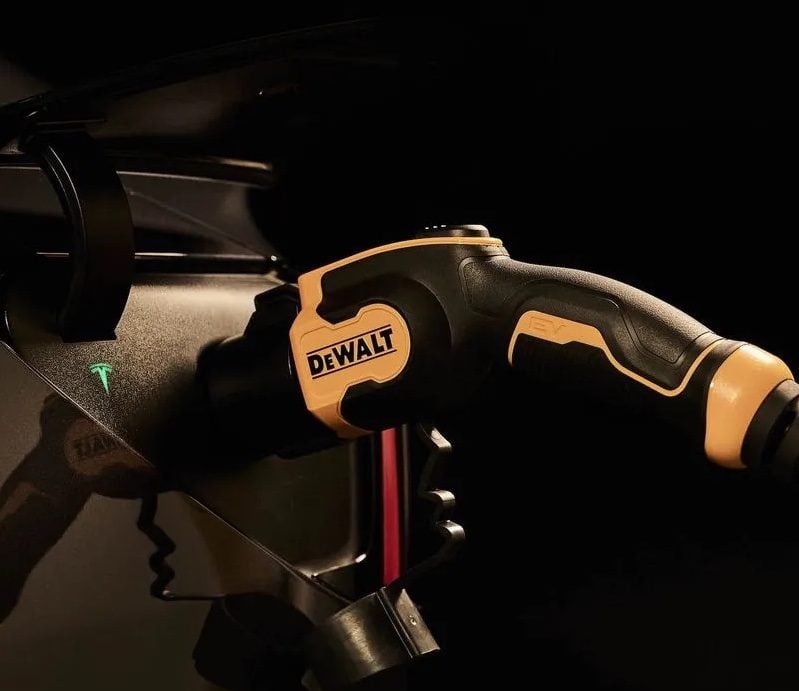
DeWalt EV Charger: Price and Installation
Pricing involves the cost of the charger you choose plus the installation. Let’s start with the three available DeWalt EV chargers:
- Wall-mounted 240V Level 2 Charger up to 48 amps – $699
- Wall-mounted 240V Level 2 Charger up to 40 amps – $699
- Portable 120V–240V Level 2 Charger up to 16 amps – $299
The price of your DeWalt EV installation depends on several factors, including location and electrical load. In my case, I had a more advanced installation that cost around $1600. I needed a location opposite the breaker panel (more cable and conduit). My completely full electrical panel also required the installation of four tandem breakers to free up space for the new 60A 2-pole breaker.
DeWalt and Paragon Group back your purchase with a 3-year warranty and 24/7 technical support.
Find more information visit the DeWalt EV Charger website.

